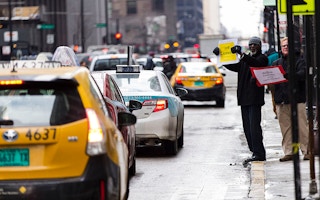More than a dozen global companies pledged on Thursday to work together on issues cities face as fast-emerging transportation technologies outstrip regulation.
Fifteen technology and transportation companies including Uber, Lyft and Zipcar said they will support a framework known as the “Shared Mobility Principles for Livable Cities”, aimed in part at reducing climate-changing emissions.
Uber’s long-term goal is “obviating the need for car ownership and making our transportation system safer, cleaner and more efficient,” said Andrew Salzberg, the company’s head of research.
Two major cities networks have already backed the principles, which were released in October, but Thursday offered the first such announcement from private transport companies including BlaBlaCar, Citymapper, Didi, Keolis, LimeBike, Mobike, Motivate, Ofo, Ola, Scoot Networks, Transit and Via.
Besides reducing emissions, the 10 principles, whose yearlong development was spearheaded by Zipcar co-founder Robin Chase, include aims such as to “prioritize people over vehicles” and “promote equity”.
Their backers said they would lead efforts to reach a “zero-emission future” and “support fair user fees” such as congestion pricing, in which drivers are charged during rush hour in an effort to reduce traffic congestion at busy times.
“
Individual users may not be willing, but these companies are thinking their business can be better if there’s less congestion.
Dario Hidalgo, transportation expert, World Resources Institute
They also said new self-driving vehicles being developed should be shared - rather than privately owned - when they are released, at least in dense urban areas.
The U.S. city of Pittsburgh, a test site for Uber’s self-driving cars, also backed the principles Thursday.
“As this transformation is happening, we have to have proactive commitments in place that will benefit the entire community,” Mayor Bill Peduto said in a call with reporters.
The rise of ride-hailing already has raised worries that it could increase rather than reduce traffic, said Dario Hidalgo, a Colombia-based transportation expert with the World Resources Institute, a Washington think-tank.
But the mobility principles appear to align with some of the companies’ values and business goals, said Hidalgo, who helped in the framework’s development.
“They may not agree with the whole package,” Hidalgo told the Thomson Reuters Foundation from Bogota. “But Uber and Lyft are willing to pay (to limit) congestion, for instance. Individual users may not be willing, but these companies are thinking their business can be better if there’s less congestion.”
This story was published with permission from Thomson Reuters Foundation, the charitable arm of Thomson Reuters, that covers humanitarian news, women’s rights, trafficking, property rights, climate change and resilience. Visit http://news.trust.org)










